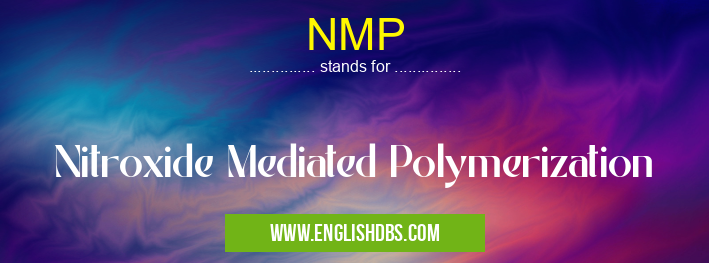What does NMP mean in UNCLASSIFIED
Nitroxide Mediated Polymerization (NMP) is a type of Controlled Radical Polymerization (CRP) technique used to synthesize polymers with controlled molecular weight, narrow molecular weight distribution, and specific end-group functionality. NMP involves the use of stable nitroxide radicals as mediators to control the polymerization process, enabling precise control over the polymer architecture and properties.

NMP meaning in Unclassified in Miscellaneous
NMP mostly used in an acronym Unclassified in Category Miscellaneous that means Nitroxide Mediated Polymerization
Shorthand: NMP,
Full Form: Nitroxide Mediated Polymerization
For more information of "Nitroxide Mediated Polymerization", see the section below.
NMP Process
NMP employs a catalytic cycle that includes initiation, propagation, and termination steps. The process typically involves the following steps:
- Initiation: A free radical initiator starts the polymerization by abstracting a hydrogen atom from the nitroxide mediator.
- Propagation: The resulting nitroxide radical reacts with a monomer, forming a new radical that can add to another monomer unit. This process continues, leading to the growth of the polymer chain.
- Termination: The polymerization is terminated by the coupling of two propagating radicals or by their reaction with the nitroxide mediator, resulting in the formation of a stable alkoxyamine end group.
Advantages of NMP
- Controlled Polymerization: NMP provides excellent control over the molecular weight and dispersity of the resulting polymer, enabling the synthesis of polymers with specific properties.
- Narrow Molecular Weight Distribution: The controlled polymerization process ensures a narrow molecular weight distribution, reducing heterogeneity in the polymer sample.
- End-Group Functionality: NMP allows for the introduction of specific end-group functionality into the polymer chain, facilitating further functionalization or conjugation.
- Versatile Monomers: NMP is compatible with a wide range of monomers, including styrene, acrylates, methacrylates, and vinyl monomers, offering versatility in polymer synthesis.
Applications of NMP
NMP has various applications in polymer science and materials engineering, including:
- Biomedical Materials: Synthesis of biocompatible polymers for drug delivery, tissue engineering, and medical devices.
- Electronic Materials: Production of conducting polymers, organic semiconductors, and dielectric materials for electronic applications.
- Specialty Polymers: Development of high-performance polymers with tailored properties, such as high toughness, low friction, or self-healing capabilities.
- Functional Polymers: Creation of polymers with specific functionalities, such as stimuli-responsive polymers or polymers with tailored surface properties.
Essential Questions and Answers on Nitroxide Mediated Polymerization in "MISCELLANEOUS»UNFILED"
What is Nitroxide Mediated Polymerization (NMP)?
NMP is a controlled radical polymerization technique that utilizes stable nitroxide radicals to control the polymerization process. It involves the reversible termination of propagating polymer chains by nitroxide radicals, leading to narrow molecular weight distributions and well-defined polymer architectures.
How does NMP work?
NMP involves the following steps:
- Initiation: A small amount of free radical initiator is added to the monomer solution.
- Propagation: The initiator generates propagating polymer chains that react with monomers to form longer chains.
- Reversible termination: The propagating chains are reversibly terminated by nitroxide radicals, forming dormant polymer chains.
- Activation: The dormant chains are reactivated by reducing agents, allowing them to continue propagating.
What are the advantages of NMP?
NMP offers several advantages over conventional radical polymerization techniques:
- Narrow molecular weight distributions: NMP produces polymers with low polydispersity indexes (PDIs), resulting in more uniform polymer properties.
- Controlled polymer architectures: NMP allows for the synthesis of polymers with specific architectures, such as block copolymers, star polymers, and dendrimers.
- Versatility: NMP can be applied to a wide range of monomers, including acrylates, methacrylates, and styrenes.
- Tolerance to impurities: NMP is relatively tolerant to impurities, making it suitable for industrial applications.
What are the applications of NMP?
NMP is used in various applications, including:
- Biomedical materials: Production of biocompatible polymers for drug delivery, tissue engineering, and wound healing.
- High-performance polymers: Synthesis of polymers with enhanced mechanical properties, thermal stability, and optical properties for use in aerospace, automotive, and electronics.
- Functional materials: Development of polymers with specific functions, such as conductivity, self-assembly, and stimuli-responsiveness.
Final Words: Nitroxide Mediated Polymerization (NMP) is a powerful technique for the synthesis of polymers with controlled molecular weight, narrow molecular weight distribution, and specific end-group functionality. Its versatility and advantages make it a valuable tool in polymer science and materials engineering for the development of advanced materials with tailored properties for various applications.
